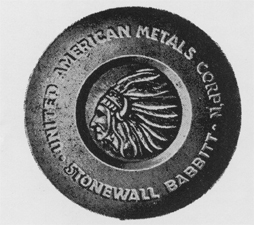Page History: Babbitt - Identification Guide
Compare Page Revisions
Page Revision: 2008/07/14 23:39
Back to main Babbitt PageBabbitt Identification
Many different grades of Babbitt were sold and marketed over the years by many different companies. Because so many different types of Babbitt "bars" are still available today, this guide will attempt to help identify and determine the uses for some of these brands. As information on the composition of different brands becomes available to us, we will add them to this list.
Magnolia Metal Corporation
Magnolia Metal Corporation began business in 1886 with a technical innovation in the then new bearing industry: the invention of lead-based babbitt metal. Less expensive than tin-based babbitt, "Magnolia Anti-Friction" was soon being shipped around the world. Over 100 years later, babbitt products comprise only 1% of Magnolia Metals sales, but the company still manufacturers several grades of Babbitt. Customers can still purchase large quantities of these Babbitt today metals directly from Magnolia.
Magnolia Anti-Friction Metal
 Magnolia Anti-Friction Metal |
Sold by the
Magnolia Metal Corporation, Magnolia Anti-Friction Metal is still available for purchase today. Introduced in 1886, Magnolia Metal (as it was commonly referred to) was advertised as "the best bearing material known to man and far superior than any other Babbitt." While there is no doubt that Magnolia Metal had it's applications and did generally perform well, it also has some limitations. Magnolia Anti-Friction Metal is a primarily lead based material, consisting of approximately 80% Lead (Pb), 15% Antimony (Sb) and 5% Tin (Sn).
According to the Magnolia Metal Corporation, Magnolia Anti-Friction Metal "meets all requirements for general use. Offers good resistance to compression and has the lowest co- efficient of friction of any known bearing metal... 1/3 that of genuine babbitt. Is graphite treated and largely self-lubricated. Typical Applications... Line shafting...electric motors 10 to 250 hp.... winches... pumps... propeller shafts... cement mills ... general machinery."
Pouring temperature for Magnolia Anti-Friction Metal is 750-825 degrees F.
Adamant Super-Genuine Babbitt
 Adamant Super-Genuine Babbitt |
Sold by the
Magnolia Metal Corporation, Adamant Super-Genuine Babbitt is still available for purchase today. Exact composition is not know but this is a tin based babbitt and suspected to be a similar formula as original Babbitt. This product would be preferred over Magnolia Anti-Friction Metal for most high speed applications.
According to the Magnolia Metal Corporation, Adamant Super Genuine Babbitt is "a genuine babbitt metal alloyed especially for malleability, strength and toughness. Will not crack or chip even when subjected to extremely severe shock loads. Easy to pour, conforms well to the shell. Typical Applications... Internal combustion engines... trap rock crushers... sifter machinery."
Pouring temperature for Adamant Super-Genuine Metal is 775-825 degrees F.
United American Metals Corporation
United American Metals Corporation was founded in 1889 by the Muscat Family in Brooklyn, N.Y. Originally, the company specialized in lead based metals to make type for the printing industry.
During the Second World War, the primary focus switched from lead type to Babbitt for the Marine industry and the general trade as part of the war effort. During this time, a new plant was opened in Tyler, Texas plant. Highest priority for use of scarce materials such as Tin and Antimony was given UAM by the War Production Board.
After WWII, the company expanded their product line to many other types of specialty metals but still makes several babbitt metals to this day.
Stonewall Babbitt
 Stonewall Babbitt |
 Stonewall Babbitt |
Made by the
United American Metals Corporation, Stonewall Babbitt has been around for many years and is still being sold today through industrial supply houses such as
McMaster-Carr. This is a Lead Based Babbitt is among the least expensive babbitt that you can buy. Composition is 80.25 percent Lead (Pb), 14.75 percent Antimony (Sb) and 5 percent Tin (Sn). While this material would work fine for light duty and low speed applications, for just a little more money, you can get a much better quality material. Probably best to shy away from for most machinery applications.
Pouring Temperature is 650 degrees F.
Government Genuine Babbitt Metal
 Government Genuine |
Also made by the
United American Metals Corporation, this tin based Babbitt is advertised as the highest grade of Babbitt metal made by that company. The composition is 89% tin, 7 1/2% antimony, and 3 1/2% Copper. According to their literature, there is no speed too high; no lead too heavy; no shock too great for Government Genuine Babbitt. This Babbitt is alloyed by the Stanley Process. It is especially adapted for band-saws, connecting rods, clay products machinery, converters, crank-pins, crushers, crushing-rolls, compressors, cutters, centrifugal pumps, dynamos, gas engines, marine engines, mill gearings, saw-mill, arbors, trimmers, steam cylinders, steam pumps, swing saws, turbines and tube mills. Ideal for automobiles, buses, diesel engines, and airplanes.
Manganese Babbitt Metal
 Manganese Babbitt Metal |
Yet another brand of babbitt metal made by
United American Metals Corporation. This lead based babbitt is 5% Tin, 14 3/4% Antimony, and with the remaining ballance being Lead.
According to their literature: There is no bearing that covers so wide a scope of service as Manganese Babbitt. Easy to cast. Makes a solid bearing and is practically self-lubricating.
Especially adapted for auxiliary pumps bagasse carriers, beaters, calendars, car axles, chemical agitators, clay machinery, conveyors, cotton-mill machinery, cottonseed oil machinery crystallizer drives, driving shafts, elevators, Fourdriniers, hoisting machinery, hydraulic presses, knitting machinery, light capacity pumps, light capacity pumps, light saw-mills, mixing mills, pulverizes, sausage grinders, saw mandrills, saw tables, shapers, woodworking machinery.
National Lead Company
The National Lead Company, renamed NL Industries in 1971, began business in Philadelphia in 1772. Several lead manufacturers banded together and incorporated as the National Lead Company in 1891. The company has been well known for its white-lead paints, sold since 1907 under the Dutch Boy label. Of the companies many products, bearing metals are included. Ingots of various types are commonly found today with the "Dutch Boy" trade mark cast into the face of the ingot.